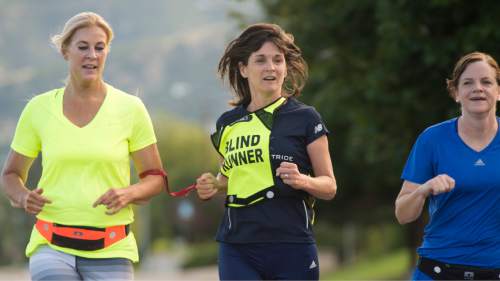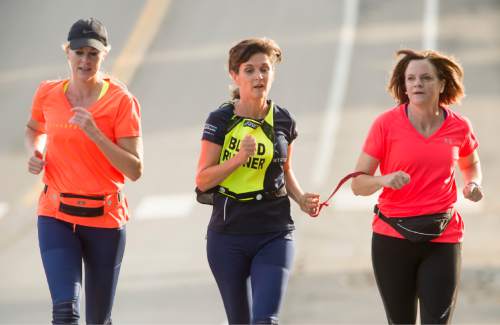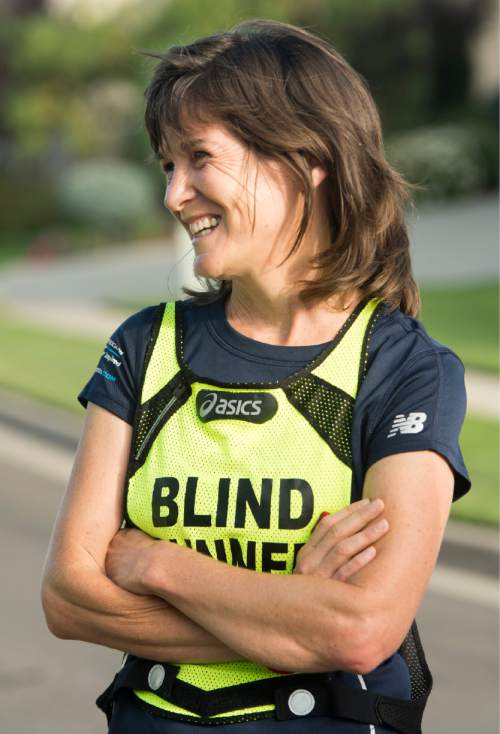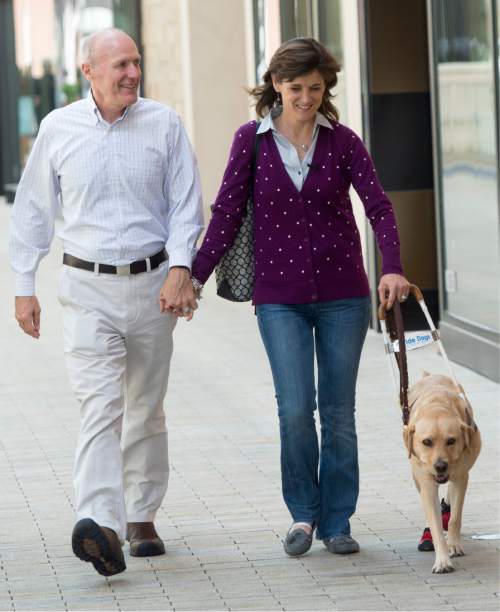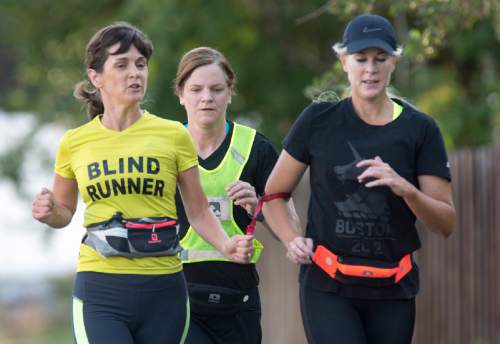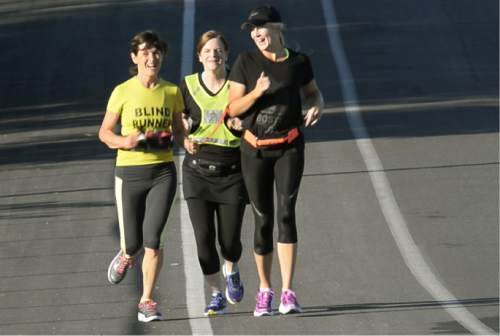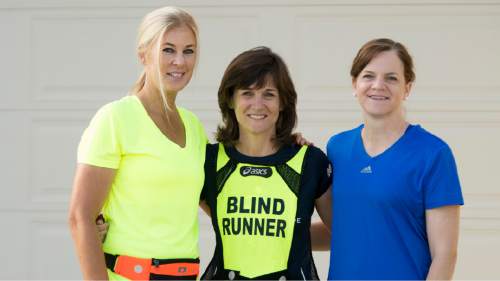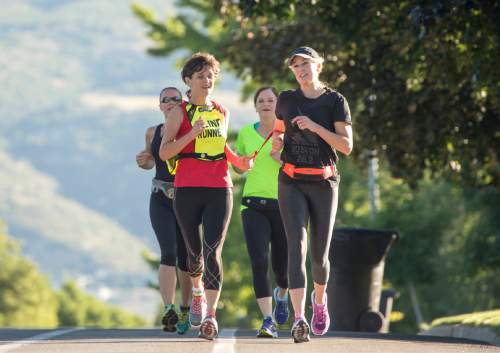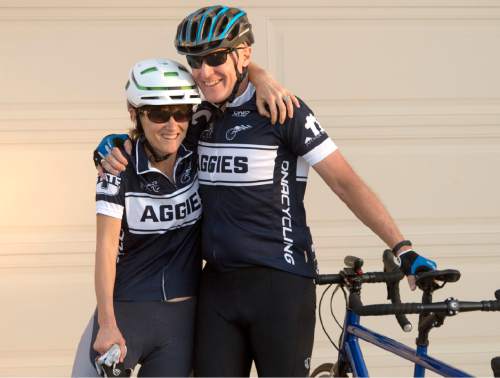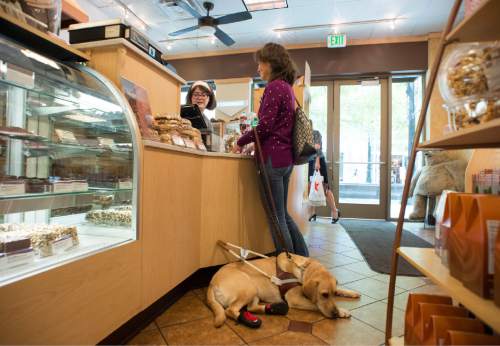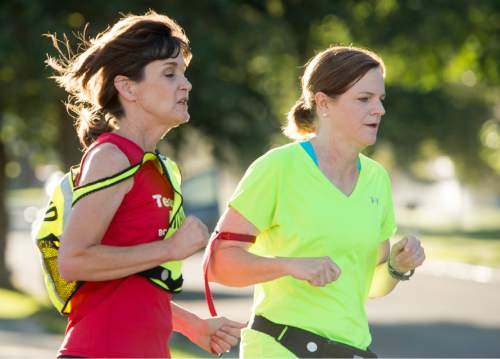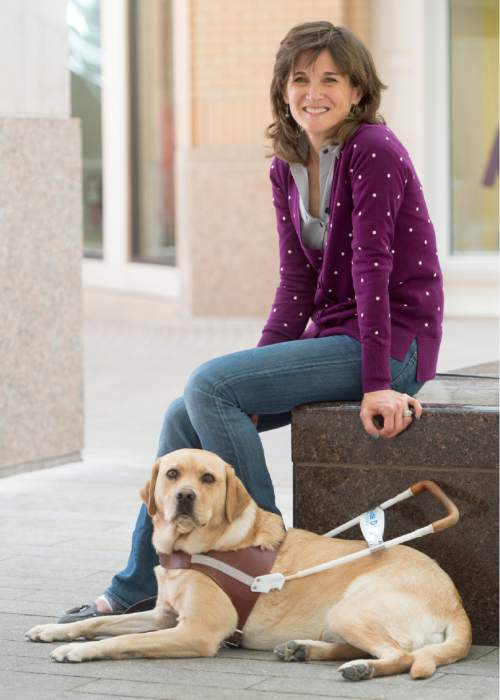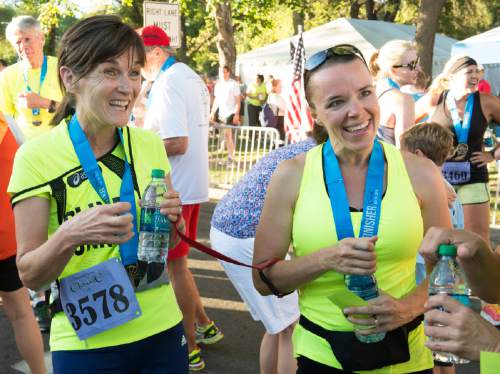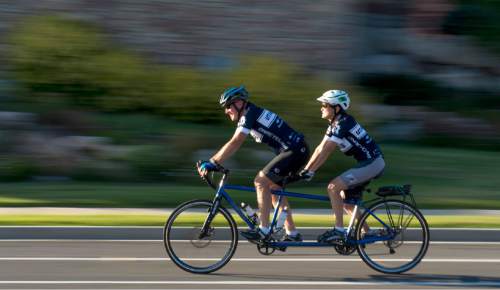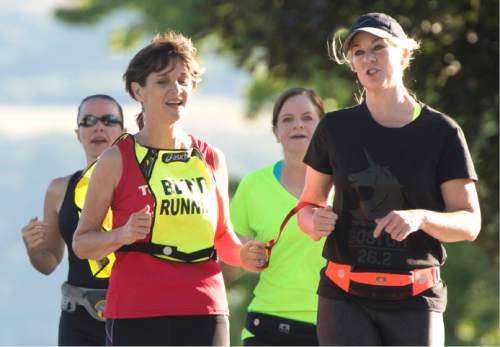This is an archived article that was published on sltrib.com in 2015, and information in the article may be outdated. It is provided only for personal research purposes and may not be reprinted.
Bountiful • Becky Andrews is sentimental about the red tandem bike she and her husband, Steve Andrews, purchased in the summer of 2000, even if it was the instrument of a whole lot of pain.
The pair were training for the MS 150 distance bike ride in Cache Valley, and it was the first tandem they'd had with clips to affix their shoes to the pedals.
Those clips proved to be Andrews' undoing when the bike tipped over twice in the span of 10 days, breaking her left arm in two places the first time, and her right arm in the second crash.
She laughs at the memory now, about how she was unable to feed herself or comb her hair with two casts up past her elbows. Acquaintances thought she and Steve were nuts to get back on the bike after the first broken arm. "It was like, 'Seriously?' "
But Andrews, of Bountiful, does not regret persuading Steve to add a cushion for her cast and help her get back in the saddle. "I wouldn't have done anything different," she says. "We laughed. That summer we did a lot!"
The episode tells something about Andrews, who is blind, and the man who helps her lead an active — if sometimes risky — life.
"It's really me pushing and being persistent and him trying to find that balance," says Andrews, a mental health counselor, motivational speaker, athlete and blogger.
—
'What we need to do' • Andrews, 50, has retinitis pigmentosa, a degenerative eye disease that began in childhood but wasn't diagnosed until she was a freshman at Utah State University.
Growing up in Cache Valley, Andrews would bump into things and could not see in dark theaters or at night. When her ophthalmologist diagnosed her at age 18, her parents sought a second opinion at the University of California, Los Angeles.
She had just begun seriously dating Steve, a Logan native, and he went along to the daylong UCLA appointment. It's a genetic disease and there were implications for any children they might have, she says.
Steve's "kind and empathetic" reaction won her over even more. "He saw our path better than I did," she says. "He would say, 'We'll do what we need to do.' "
The two married the next summer and remained in Logan until after she graduated with a business degree. Steve, six years older, had already graduated from USU.
Andrews did not think of herself as blind for several years. She was still driving short distances on errands but was losing her peripheral vision. She stopped driving at age 28.
"There was a morning that was a turning point for me," she recalls.
The couple were living in Centerville, and Andrews had just begun using a cane. She was home with their two young children, Natalie and Kendall, while Steve worked as a banker. (Neither child inherited retinitis pigmentosa).
She was feeling her limitations, worrying about her ability to be the mother she wanted to be. But she made a conscious decision not to wallow.
"I told myself, 'I owe it to them. I can make a good life!' "
So she and the kids boarded a Utah Transit Authority bus, rode into the Salt Lake Valley and ate lunch with Steve.
A second turning point came when she could no longer recognize faces. She and Steve were in St. George, and she was discouraged. Steve, however, just went on, enthusing about a new trail they could try on their tandem bike.
Again she made a conscious decision. "Life's going on, life's good," she told herself.
—
Counseling, raising awareness • As her children grew, she and Steve became involved with Foundation Fighting Blindness, and she began working at the Moran Eye Center in patient outreach. After earning two master's degrees, she became a licensed clinical mental health counselor.
Eventually, she and Steve founded Resilient Solutions, a Bountiful-based counseling center with 15 therapists. Andrews sees 15 to 20 clients a week, specializing in grief and loss, but also women's issues, anxiety, depression and some marriage counseling.
"I walk into work and I think, 'I'm doing just what I love!' " says Andrews. "It feels like a second home."
She gives at least one motivational talk a month, often traveling to other cities with Georgie, her third guide dog.
"It's complicated, but it's also pretty simple," she says of her busy life.
Andrews embraces tools — a cane, a guide dog, a smartphone that speaks to her, a tether to run with friends — that have been "a blessing and a help," Steve says.
But they also make her disability more apparent. Shortly after she got her first guide dog in the 1990s, she was ordered out of a grocery store. She ended up educating the store employees about the Americans with Disabilities Act, which protects the rights of those with guide dogs to have them in all public places.
As recently as 2012, shortly after City Creek Mall opened, a clerk at the Ann Taylor store told Andrews to leave because of her guide dog.
That episode got national attention. Though angry and hurt, Andrews accepted the corporation's apologies and ended up speaking at a breakfast meeting of Ann Taylor managers from throughout the country.
"You do so much more good by educating," she says.
—
Togetherness • Steve jokes that, when the kids were small, he would secretly wish his wife was less interested in "doing her part."
She volunteered for everything, including leading Girl Scouts, and that made him the chauffeur.
In fact, her dependence on him for driving — she also takes ride-hailing services or a taxi when necessary — has meant the two spend much more time together than many couples. They shop for groceries together, for instance.
"I like being with her," he says, shrugging.
Her runningmates feel the same way.
Brenda Petersen and Suzette Hirst run with Andrews several times a week and at area marathons. Last April, they were her guides in the Boston Marathon, taking turns on a tether that attaches to the guide's upper arm. Andrews holds the tether in her hand as they run, and the guide warns her of upcoming turns or obstacles.
The trio also ran the Top of Utah and Utah Valley marathons.
"She's such a great running partner. She brings so much to the table," says Petersen. "She understands people so well and is so pleasant to be around. She gives me a reason to get out of bed on a cold morning.
"We guide her, and she keeps us encouraged."
Twitter: @KristenMoulton


